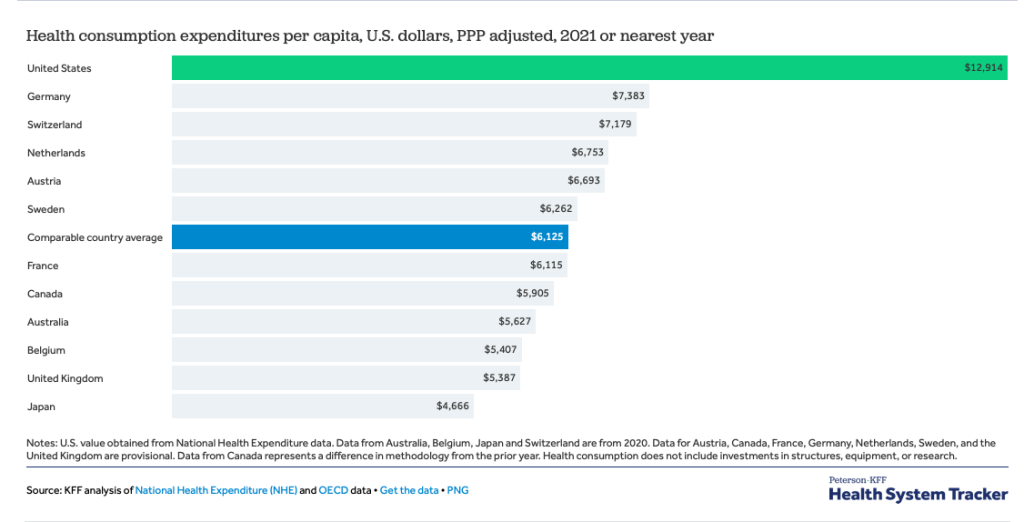How the Obesity-Industrial Complex Keeps Americans Sick, Fat, and Sad

All Global Research articles can be read in 51 languages by activating the Translate Website button below the author’s name.
To receive Global Research’s Daily Newsletter (selected articles), click here.
Click the share button above to email/forward this article to your friends and colleagues. Follow us on Instagram and Twitter and subscribe to our Telegram Channel. Feel free to repost and share widely Global Research articles.
***
The United States spends more money per capita on healthcare than any other country on Earth – almost twice as much as Germany and triple Japan. To emphasize, this is the average spending on an individual level, so it’s triple the spending of Japan per person.
Source: Peterson-KFF Health System Tracker
And what do Americans get for all that spending?
The US is the fattest and the sickest in terms of chronic disease rates in the world. Per Statista, “the CDC estimates that six in ten adults in the United States currently live with a chronic disease such as cancer, heart disease, or diabetes.” You probably know someone personally – in all likelihood, multiple people – who suffers from a chronic health condition.
Much of that disease burden is due to obesity. “Adult obesity rates have more than doubled since the 1980s — in the U.S. today, obesity affects over 42% of adults and 18% of youth. Obesity and its related complications are major drivers of rising healthcare costs, diminished health-related quality of life, and the recent decline in U.S. life expectancy,” per the STOP Obesity Alliance.
Many factors drive obesity – diet, lack of movement, poor sleep, hormonal deficiencies and imbalances, etc. But the medical system that profits off of obesity – while miseducating the public for profit — is one of the worst offenders.
Which brings us to a phenomenon some have dubbed the “obesity-industrial complex.”
Yes, the something-complex terminology, borrowed from the term “military-industrial complex” coined by President Eisenhower in his farewell address, is drastically overused. But, in the case of the obesity-industrial complex, the moniker isn’t without justification.
There exist many parallels between Eisenhower’s military-industrial complex and the obesity-industrial complex.
In fact, in one little-known facet of the infamous Eisenhower speech that I have written about previously, the outgoing president warns of the prospect of a silent technocratic coup over society and government by a “scientific-technological elite”:
“Akin to, and largely responsible for the sweeping changes in our industrial-military posture, has been the technological revolution during recent decades.
In this revolution, research has become central; it also becomes more formalized, complex, and costly. A steadily increasing share is conducted for, by, or at the direction of, the Federal government.
Today, the solitary inventor, tinkering in his shop, has been overshadowed by task forces of scientists in laboratories and testing fields. In the same fashion, the free university, historically the fountainhead of free ideas and scientific discovery, has experienced a revolution in the conduct of research. Partly because of the huge costs involved, a government contract becomes virtually a substitute for intellectual curiosity. For every old blackboard there are now hundreds of new electronic computers.
The prospect of domination of the nation’s scholars by Federal employment, project allocations, and the power of money is ever present–and is gravely to be regarded.
Yet, in holding scientific research and discovery in respect, as we should, we must also be alert to the equal and opposite danger that public policy could itself become the captive of a scientific-technological elite.”
As George Carlin once observed, conspirators don’t need to meet in smoke-filled rooms when their interests converge. It’s a question of incentives. When all the requisite incentives are present, what begin as backroom conspiracies simply become the way the system works.
What’s not going on is a cabal of millions of evil general practitioner physicians twirling their cartoonish handlebar mustaches, plotting how best to sicken their patients and extract maximum cash in the process.
Obesity is first reframed as a medical problem that needs to be medicated, not a lifestyle problem that can be remedied in virtually all cases with simple dietary adjustments and exercise. This process, which I have written about before in the context of transgenderism, is called “medicalization.”
It’s classic problem-reaction-solution: first you create the problem, the public clamors for a proper reaction (looking to the government as a paternal protector and provider), and the interests that control the government offer their solution – which, not coincidentally, always involves more social control and profits for them.
Much like the military-industrial complex, in which weapons contractors launder scare stories through the media to induce support for more war, which they profit off of, the obesity-industrial complex benefits from perpetuating chronic disease because that’s how their bread gets buttered.
The corporate media is also intricately involved in the grift. They take pharma ad dollars to the tune of billions per year, and in exchange actively participate in the reframing of obesity as a medical problem requiring pharmaceutical intervention.
Via The Guardian:
“During a prime-time breakfast slot on BBC Radio 4 last week, a leading obesity expert sang the praises of a blockbuster new weight-loss treatment.
The appetite-suppressing Wegovy injections were “one of the most powerful pharmaceutical tools” to date for treating obesity, Prof Jason Halford told the nation.
The problem, he said, would be ensuring enough people could get hold of them.”
The regulatory agencies of government, which are responsible for vetting new pharmaceutical products, likewise receive kickbacks — to the tune of hundreds of millions of dollars in some cases — for greenlighting “breakthrough” new pharmaceutical products, no questions asked.
Everybody gets in on the grift – except, of course, the average consumer.
If the powers that be were truly interested first and foremost in human health, the White House nutrition advisor wouldn’t absurdly claim in official guidelines that Lucky Charms are healthier than chicken. They wouldn’t rebrand morbid obesity as some sort of pseudo-feminist form of empowerment.
*
Note to readers: Please click the share button above. Follow us on Instagram and Twitter and subscribe to our Telegram Channel. Feel free to repost and share widely Global Research articles.
This article was originally published on The Daily Bell.
Ben Bartee is an independent Bangkok-based American journalist with opposable thumbs.


